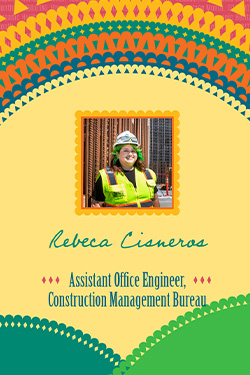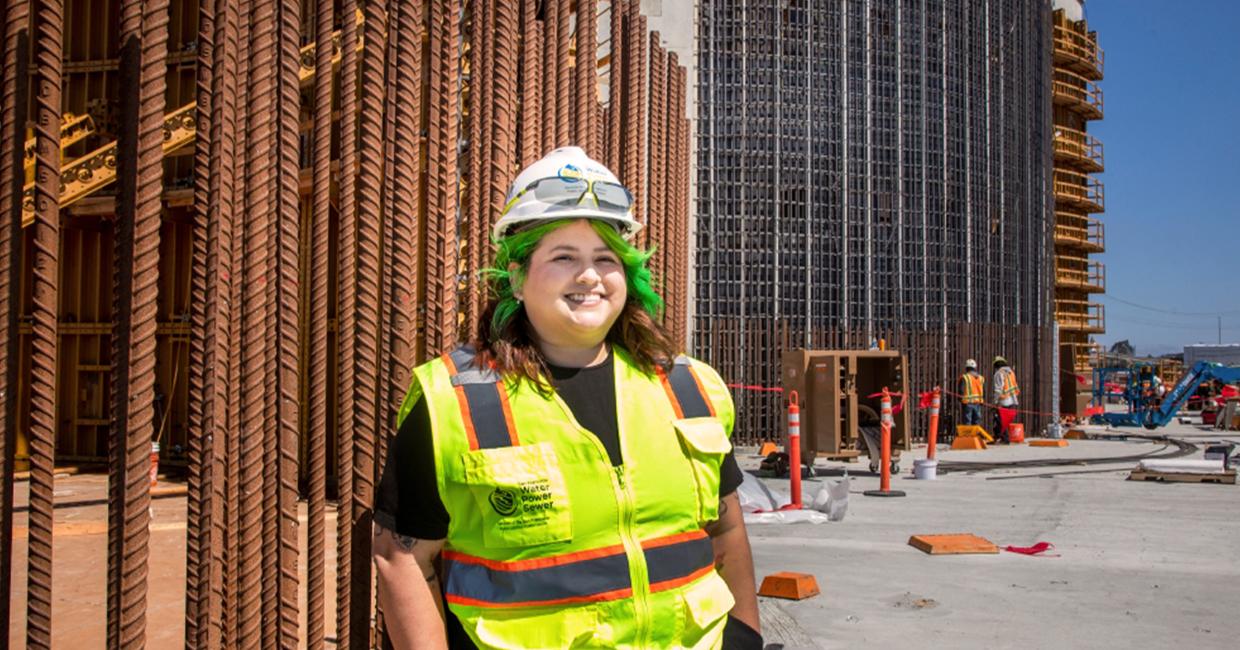Rebeca Cisneros is an Assistant Office Engineer, working on the Biosolids Digesters Facilities Project (Biosolids Project) construction. She started at the San Francisco Public Utilities Commission (SFPUC) as an office intern in 2015 and when she began working at the Harry Tracy Water Treatment Plant, she was introduced to the construction side of things. “I fell in love with construction,” she says with a big smile, which led to where she is now at the SFPUC.
Biosolid Project’s Construction Manager Ryan Cayabyab had recruited Cisneros when she was an intern. She now works with Cayabyab out at the Bayview Biosolids Project construction site - where the SFPUC is building critical upgrades to transform the City’s Southeast Treatment facility into a modern resource recovery center.

“Ryan’s support is endless and his experience in construction is invaluable,” said Cisneros. “I feel supported here because everyone on the Biosolids Project team is always willing to share their knowledge.”
Reflecting on her Heritage
As Hispanic Heritage Month approached, Cisneros reflected on her own heritage. She had a lot to say about the Spanish language.
“My grandparents focused on learning English throughout my childhood and my parents struggled with English as a second language when they were children,” she recalled. “As I grew up, no one required me to learn Spanish.” Cisneros added that this can actually be a common experience as a second generation American. “I think my family didn’t want us kids to have a hard time like they did. I wasn’t surrounded by the Spanish language.”
So, after high school, she chose to attend California State University of Long Beach. “I wanted to go there for the Engineering program, but also for the Latine culture.” ‘Latine’ is a word she chooses to use, which is used by many Spanish speakers around the world.
Once at college, she joined Hispanic organizations to help her academically. She immediately found herself surrounded by the Spanish language and experienced some culture shock.
“I felt like an outsider,” she remembered. “I wasn’t as fluent as I thought.”
But the challenges for Cisneros went deeper. “I began to see that the Spanish I learned at home was a mix of Mexican and Nicaraguan – so when I used things like slang terms, people at college would go, like, … ‘what?’” She started to see that the Spanish language itself has variation everywhere it is spoken.
But in the end, organizations like Hermanas Unidas de Long Beach (United Sisters of Long Beach, also known as HaU) became more than a way for Cisneros to become fluent in Spanish. “It’s where a majority of my friend group came from in college.” The groups provided community service together, participated in professional development, and attended social events with branches at other Cal State and UC schools.
“My friends spoke Spanish all the time,” said Cisneros. “A lot of them were local residents, so I went to a lot of family parties around L.A. I immersed myself in my culture.”
But becoming fluent was just part of the cultural benefits of college. She described a class assignment started her on a path that continues to create a deeper connection to her grandparents. “I was assigned to write an essay about someone in my life. I interviewed my grandmother.”
Cisneros learned that, when her grandfather was a teenager he worked in strawberry fields. He would drive with his cousins up to Bakersfield each day to work – and then they would drive back home to Mexico every night.
“I never knew that!” She also didn’t know that her grandmother escaped a bad marriage to immigrate here. “I think they were both raised not to discuss their struggles in life unless someone asked directly,” she said.
And now, feeling closer to her grandparents through family stories, her passion for the Spanish language continues to strengthen family ties. “I’m talking a lot more with my grandparents.” She added that her grandfather has Alzheimer’s and it’s even more important. “He is starting to forget the English he learned and only a few of us grandkids can fully communicate with him in Spanish.”
“I feel closer to my grandfather more than ever before.”


